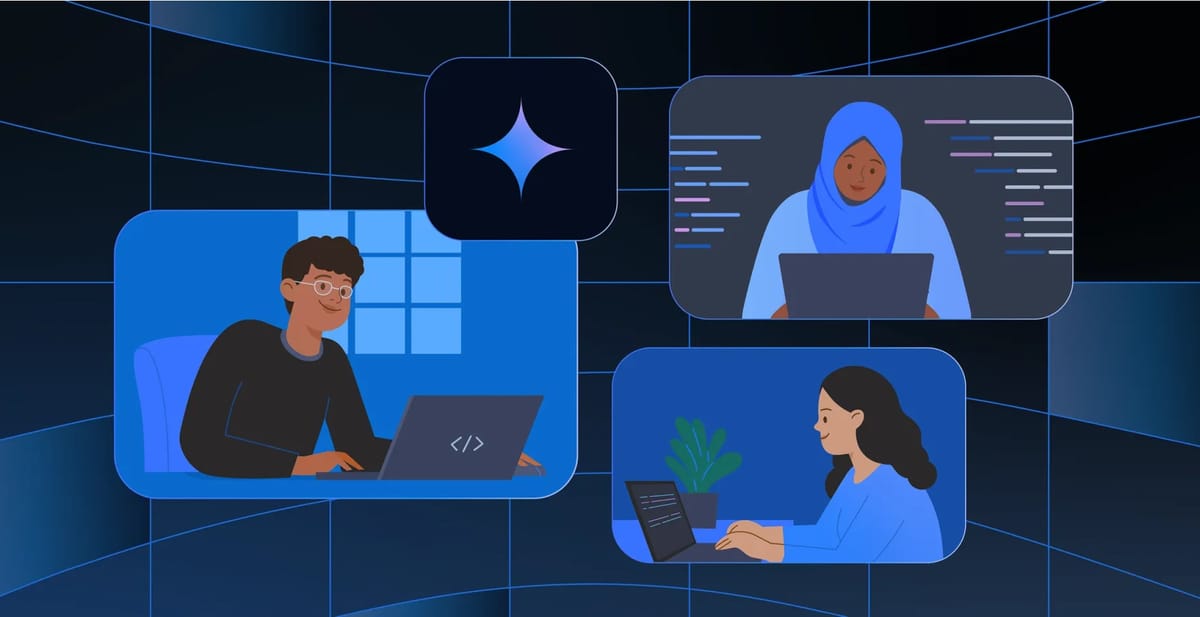
AI-assisted coding has quickly emerged as a fundamental part of the modern developer workflow. But for many developers, access to frontier models has been limited by usage caps and paywalls. Today, Google is changing that with the launch of a free version of Gemini Code Assist, offering the most generous AI coding limits yet—up to 180,000 completions per month. The company is also rolling out AI-powered code reviews for GitHub, giving developers automated feedback on their code to improve quality and reduce bottlenecks.
Key Points:
- Free Gemini Code Assist offers 180,000 monthly code completions (90x more than GitHub Copilot's 2,000)
- Includes free AI-powered code reviews for both public and private GitHub repositories
- Requires only a Gmail account with no credit card needed, available globally
The company is effectively offering individual developers—students, hobbyists, freelancers, and startup teams—the same advanced AI coding capabilities that already generates 25% of Google's own internal code production.
Ryan Salva, Senior Director of Product Management at Google, sat down with Maginative to explain the vision behind Google's decision to offer such generous limits.
"These models are data hungry. They tend to provide better responses when they're given more context," Salva explained during our interview. "Our goal with this release was to make it so that you would have to be the most insanely dedicated developer coding fourteen hours a day to actually hit any of the limits."
Salva emphasized that the move is meant to level the playing field. "How much of a disadvantage are you at if you don't have access to these same tools?" he asked, noting that 75% of professional developers already use AI in their daily work according to Google's recent DORA research.
Gemini Code Assist is powered by Gemini 2.0, specifically fine-tuned for coding through analysis of real-world use cases. One of its biggest advantages is its massive context window—one of the largest in the industry—allowing it to consider more of a developer’s existing codebase when generating responses. The free tier provides 128,000 input token support in chat.
While the paid versions still maintain advantages like the ability to index private repositories across GitHub, GitLab, and Bitbucket for organizational context, the free version provides substantial functionality within the local IDE environment.
Beyond the announcement of the free tier, Google is also introducing Gemini Code Assist for GitHub, which provides AI-powered code reviews. This tool can detect stylistic issues and bugs while automatically suggesting code changes and fixes. It also supports custom style guides, allowing teams to define specific coding standards in a .gemini/styleguide.md file in their repository.
"When you write some code, you send the PR, and you've got a coworker on the other side who's going to do a code review," Salva told Maginative. "What we've done is essentially created an AI agent that you install in GitHub. Every time you go to merge your code or send a pull request, the agent will review the code."
For open-source maintainers who often receive numerous code contributions, this automated first-pass review could significantly reduce the maintenance burden.
In the near future, Salva sees AI coding assistance evolving beyond suggesting individual lines of code to helping developers think about entire systems. "When we think about agents, one of the main things I think about is how we start to think about systems rather than individual logic loops," he said during our interview.
This could fundamentally change who participates in software development. "Once you remove that syntactical language barrier, we're going to invite a lot more people to participate in software development," Salva predicted. "I'm not talking just about simple office expense trackers. I'm talking about how we invite the designer to participate more in the software development, or the marketing person, or the product manager."
Nevertheless, he emphasized that human oversight remains essential: "The role of the human is to be inventive, to decide which problems are worth solving, to really think about what they might want to create."
Google's announcment comes amid intensifying competition in the AI coding assistant market. While Salva didn't directly compare performance metrics against specific models, he noted that Gemini 2.0 consistently ranks in the top five on LM Arena benchmarks.
The free version of Gemini Code Assist is available now and supports all programming languages in the public domain. Developers can install it in Visual Studio Code, JetBrains IDEs, and GitHub with a personal Gmail account.

